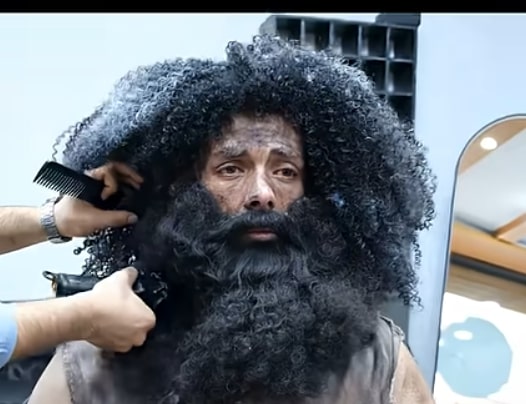For the past eight years, Lucien had claimed the same worn-out bench on Rue Lafayette. It wasn’t much—chipped paint, uneven slats—but it was his. From that bench, he watched the city move on without him. People rushed to work, lovers laughed, dogs barked, and every now and then, someone tossed a coin into his cup without looking.
Once, Lucien had built things. Concrete, steel, timber—he had been a construction foreman, proud of every building he helped raise. But when the factory closed and the layoffs hit, it all unraveled. A few bad choices. A few missed payments. Then eviction. Then silence.
Now, he sat invisible, beneath layers of time and grime.
Until Élise.
She walked past him every morning—always carrying a silver case, her auburn hair tied in a messy bun, dressed in black with red sneakers. She ran a tiny mobile salon, working freelance for weddings, elderly clients, and anyone who couldn’t make it to a shop.
Lucien noticed her, mostly because she noticed him. She smiled. Not the fake, tight-lipped kind. The real kind. The kind that lingers.
One morning, she stopped.
— “Hi. You’re always here early,” she said.
Lucien blinked, startled. No one had addressed him directly in weeks.
— “Yeah,” he muttered. “The bench doesn’t sleep in.”
She laughed.
— “I’m Élise. I’m a hairdresser. And… I was wondering if you’d let me give you a trim?”
Lucien frowned. A prank?
— “Why?”
— “Because it’s what I do. And because I think everyone deserves to feel human. Even just for a moment.”
He looked away, ashamed.
— “No money,” he said.
— “Didn’t ask for any.”
A long pause. Then a nod.
That afternoon, Élise returned. She brought a folding chair, a mirror the size of a pizza box, and a thermos of hot water. She knelt beside him on the sidewalk, unlatched her case, and started brushing his tangled hair.
Lucien winced as she tugged through knots, but said nothing.
— “How long since your last haircut?” she asked gently.
— “Before the layoffs. Maybe nine years.”
She hummed softly as she worked. Her hands were precise, fast, kind. Strands of hair dropped into the wind like feathers.
Then came the beard. She lathered his cheeks and neck with a soft foam, then trimmed, shaped, and wiped his skin clean. She handed him a tissue.
— “Ready to see?”
Lucien stared at the mirror.
The man staring back had strong cheekbones, deep-set eyes, and a determined chin. His expression was stunned, unsure—like a statue learning how to feel.
He swallowed hard.
— “Is that… me?”
Élise smiled.
— “That’s always been you.”
For a moment, Lucien couldn’t speak. The world around him blurred.
The next day, someone stopped to offer him a sandwich. Then another person dropped a note with a job lead. Word had spread—Élise had posted a photo, with Lucien’s permission, and a caption that read:
“Dignity isn’t given. It’s uncovered.”
The post exploded.
People began approaching Lucien—not with pity, but with respect. One afternoon, a man in a suit crouched beside him.
— “Lucien? You don’t remember me, but I was your apprentice at DeForge. You trained me on site. You were the best.”
Lucien’s eyes widened. Mathieu, now a project manager. They talked for twenty minutes. By the end, Mathieu handed him a card.
— “If you ever want work again, real work… call me. No pressure.”
Lucien didn’t sleep that night. He sat on the bench, gripping the card, feeling something he hadn’t felt in years—possibility.
Over the following weeks, Élise returned every few days—sometimes with a coffee, sometimes with just a wave. Lucien started shaving on his own with a razor she gifted him. He took showers at the community center. He even began helping the janitor clean the courtyard, just to feel useful.
Then, in early spring, something changed. Lucien stood at the bench. He didn’t sit.
He walked to a payphone with Mathieu’s card.
— “I’m ready,” he said.
He started as a night guard at a construction site. Quiet shifts, simple duties. But it was a start.
Months passed. Lucien moved into a transitional housing unit. He bought a secondhand blazer. He printed a résumé. He didn’t just exist—he began to live.
One afternoon, he passed by Élise’s mobile setup in the park. She was finishing up with an elderly man.
Lucien approached, cleaned up, freshly shaved.
— “Still offering free trims?” he asked, grinning.
Élise looked up, stunned.
— “Lucien?”
He laughed.
— “Told you the bench didn’t sleep in.”
She jumped up and hugged him.
— “You look… incredible.”
— “It’s thanks to you,” he said.
She shook her head.
— “No. I just gave you a mirror. You did the rest.”
He nodded slowly.
— “You reminded me I existed. That was all I needed.”
That evening, they sat on a bench together—not his old one, a new one facing the river. People walked by. Some recognized him. Some didn’t. It didn’t matter.
Lucien had returned—not just to society, but to himself.
And it all started with a question:
“Would you like a haircut?”
